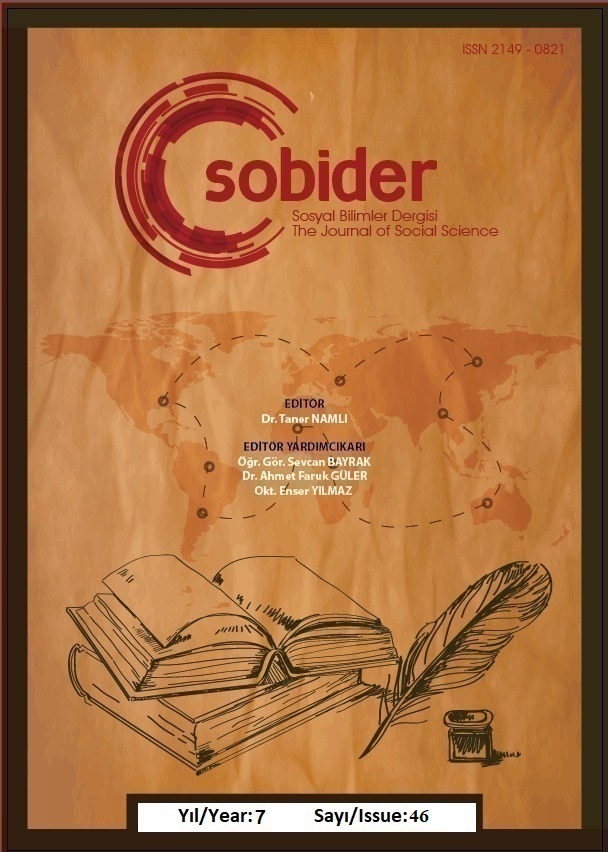Author :
Abstract
Klâsik Türk Mûsıkîsi ağırlıklı olarak söz mûsıkîsi olup meşk adı verilen bir eğitim sistemiyle gelişimini sağlamıştır. Meşk eğitimindeki ana unsur olan icra, tavır ve üslup; ezber ve taklit yöntemiyle hocadan talebesine aktarılmaktadır. Notanın kullanılmadığı veya yeterli düzeyde notalı icranın yapılamadığı dönemlerde meşk sistemi sayesinde mûsıkî eserleri kuşaktan kuşa intikal ederek büyük ölçüde unutulması engellenmiş ve günümüze ulaşmasına olanak sağlamıştır. Klâsik Türk Mûsıkîsi bünyesinde Kâr, Kârçe, Kâr-ı Natık, Beste, Ağır Semâî, Yürük Semâî ve Şarkı gibi çok sayıda sözlü beste türlerini barındırmaktadır. Bugün elimizde bulunun en eski eser, Kâr türüne aittir. Kârlar dindışı beste türleri arasında en ihtişamlısı olarak bilinmektedir ve bu beste türündeki ilk örnek Abdülkâdir Merâgî’ye aittir. XV. yüzyıldan günümüze bu kadim beste türünde eserler veren pek çok bestekâr yetişmiştir. Bu bestekârlardan en önemlilerinden birisi, de Ebubekir Ağa’dır.Türk müziği tarihinde Lale dönemin en önemli temsilcilerinden kabul edilen Ebubekir Ağa’nın Yegâh makamında Kâr formunda bestelediği eserinin makamsal analizi bu çalışmanın ana konusunu teşkil etmektedir. Günümüzde az kullanılan Yegâh makamı ve kadim Türk müziği türlerinden olan Kâr formu bu çalışmada detaylı bir şekilde ele alınarak araştırmacıların bilgilerine sunulmuştur. Bu makalede bir bestekâr olarak Ebubekir Ağa’nın mûsıkî yaşamı, Klâsik Türk mûsıkîsindeki konumu ve bestelediği Yegâh makamında Kâr eseri tanıtılmaya çalışılmıştır. Aynı zamanda Sistemci Okul olarak adlandırılan Urmiyeli Safiyüddin’den günümüze ulaşan çeşitli kuramcıların edvârlardaki tanımlamalarıyla Yegâh makamı açıklanmıştır.
Keywords
Abstract
Classical Turkish Music is predominantly the music and has developed through an education system called “meşk”. Execution, attitude and style, which are the main elements in “meşk” training; It is transferred to the student from his teacher by means of memorization and imitation. During the periods when the note is not used or if the performance of sufficient scores is not performed, the musical works have been prevented to be forgotten to a great extent by preventing the musical works from generation to bird. Classical Turkish Music includes many types of oral compositions such as “Kâr, Kârçe, Kâr-ı Natık, Beste, Ağır Semâî, Yürük Semâî” and Song. The oldest work we have today belongs to the type of Profit. Profits are known to be the most magnificent among the non-religious composition types, and the first example in this composition type belongs to Abdülkâdir Merâgî. XV. Many composers who have produced works of this ancient composition type have been trained since the 19th century. One of the most important of these composers is Ebubekir Ağa. The main subject of this study is the analysis of Ebubekir Ağa's work, which was accepted as one of the most important representatives of the “Lale” period in Turkish music history, in the form of “Kâr” in the makam Yegâh. The “Yegâh makam” and the form of ancient Turkish music, which is less used today, is presented in detail in this study and presented to the information of the researchers. In this article, an attempt was made to introduce the musical life of Ebubekir Ağa as a composer, his position in Classical Turkish music, and “Kâr in the Yegâh makam” he composed. At the same time, the authority of Yegâh was explained by the descriptions of various theorists from “Urmiyeli Safiyüddin”, which is called the Systemist School, from the theories.
Keywords
- Aksoy, B., (2008). “Geçmişin Mûsıkî Mirasına Bakışlar”, Pan Yayıncılık, İstanbul.
- Arısoy, M. (1998). “Seydî’nin El Matlâ Adlı Eseri Üzerine Bir Çalışma”, (Yayınlanmamış Yüksek Lisans Tezi), Marmara Üniversitesi Sosyal Bilimler Enstitüsü, İstanbul.
- Başer, F, A. (1996).”Türk Mûsıkîsinde Abdülbaki Nasır Dede”, Marmara Üniversite Sosyal Bilimler Enstitüsü, Doktora Tezi sf. 189-190.
- Cevher, M. H. (1992). “Tanbûri Cemil’in Rehberi Mûsiki”, Ege Üniversitesi, Sosyal Bilimler Enstitüsü Yüksek Lisans Tezi, İzmir.
- Ceyhan, Â. (1997). “Bedr-i Dilşad’ın Murâd-Nâmesi”, Milli Eğitim Basımevi, İstanbul.
- Ezgi, S.(1953) “Nazarî, Amelî Türk Mûsikîsi”, cilt III, İstanbul Konservatuarı Neşriyatı, İstanbul.
- Judetz, E.P. (2002). “Tanburi Küçük Artin”, Pan Yayıncılık, İstanbul.
- Kamiloğlu, R. (2007). “Ahmedoğlu Şükrullah ve Edvâr-ı Mûsikî Adlı Eseri”,(Yayınlanmamış Doktora Tezi), Ankara Üniversitesi Sosyal Bilimler Enstitüsü, Ankara.0
- Kamiloğlu, R. (1998).”Şehri Kırşehri El-Mevlevi Yusuf İbn Nizameddin İbn Yusuf Rumi'nin Risale-i Mûsıkîsi'nin Transkribe ve Değerlendirilmesi”, İnönü Üniversitesi Sosyal Bilimler Enstitüsü Tarih Eğitimi Anabilim Dalı, Yüksek Lisans Tezi.
- Küçükgökçe, Ö. (2010). “XV. Yüzyılda Makâmlar”, Dokuz Eylül Üniversitesi Sosyal Bilimler Enstitüsü İslam Tarihi ve Sanatları Anabilim Dalı İslam Tarihi Ve Sanatları Programı Basılmamış Doktora Tezi, İzmir.
- Özalp, M.N. (2000). “Türk Mûsikisi Tarihi”, 1. Cilt, Milli Eğitim Bakanlığı Yayınları,
- Özcan, N. (1994). “Ebûbekir Ağa Maddesi”, TDV İslâm Ansiklopedisi, 10. cilt, İstanbul.
- Özkan, İ. H. (2001). “Kâr” maddesi”, TDV İslâm Ansiklopedisi, cilt 24.
- Özçimi, M. S. (1989). “Hızır Bin Abdullah ve Kitâbü’l-Edvâr”, (Yayınlanmamış Yüksek Lisans Tezi), Marmara Üniversitesi Sosyal Bilimler Enstitüsü, İstanbul.
- Sezikli, U.(2000). “Kırşehirli Nizâmeddin İbn Yûsuf’un Risâle-i Mûsikî Adlı Eseri”, (Yayınlanmamış Yüksek Lisans Tezi), Marmara Üniversitesi Sosyal Bilimler Enstitüsü, İstanbul.
- Tekin, H. (1999). “Lâdikli Mehmet Çelebi ve er-Risâletü’l Fethiyye’si”, (YayınlanmamışDoktora Tezi), Niğde Üniversitesi Sosyal Bilimler Enstitüsü, Niğde.
- Tezel, Ş. (1996) “Tirevî Kadızâde’nin Mûsikî Edvârı ve Seydî’nin El-Matla’ı ile Karşılaştırılması”, (Yayınlanmamış Lisans Tezi), Dokuz Eylül Üniversitesi Güzel Sanatlar Fakültesi, İzmir.
- Tırışkan, A.G. (2000). “Haşim Bey’in Edvarı”, İstanbul Teknik Üniversitesi Sosyal Bilimleri Enstıtüsü, Yüksek Lisans Tezi. İstanbul.
- Uslu, R. (2001). Mehmed Hafid Efendi ve Mûsıkî”, Pan Yayıncılık, İstanbul.
- Tanrıkorur, C. (2005). “Osmanlı Dönemi Türk Mûsıkîsi “(5.Basım). Dergâh Yayınları, Ankara.
- Toz, C. (1999). “Ahmet Avni Konuk’un Hânende Mecmuâsı”, Osmanlıcadan Türkçeye Çevirisi, Yüksek Lisans Tezi, İstanbul Teknik Üniversitesi Sosyal Bilimler Enstitüsü,
- Tura, T., (2001). “Kantemiroğlu Kitabu ‘İlmi’l-Mûsıkî ‘ala vechi’l- Hurufat”, Yapı Kredi Yayınları, İstanbul.
- Yavaşça, A. (2002) “Türk Mûsıkîsi’nde Kompozisyon ve Beste Biçimleri”, Türk KültürüneHizmet Vakfı, İstanbul.
- Yücel, H. (2016). “Türk Sanat Müziği Türler Bibliyografyası”, Eğitim Yayınları, Konya.
- Yücel, H. (2016). “IX-XV. Yüzyıllar Arası Mûsıkî Kaynakları Üzerine Bir İnceleme”, Akademik Sosyal Araştırmalar Dergisi, Yıl: 4, Sayı: 23, Mart 2016, s. 301-323
- Yücel, H. (2017). “Türk Müziğinde Ud Eğitimi ve Ud Metotları Üzerine Bir İnceleme “, İdil, Cilt 6, Sayı 32, sf. 1413-1425.





